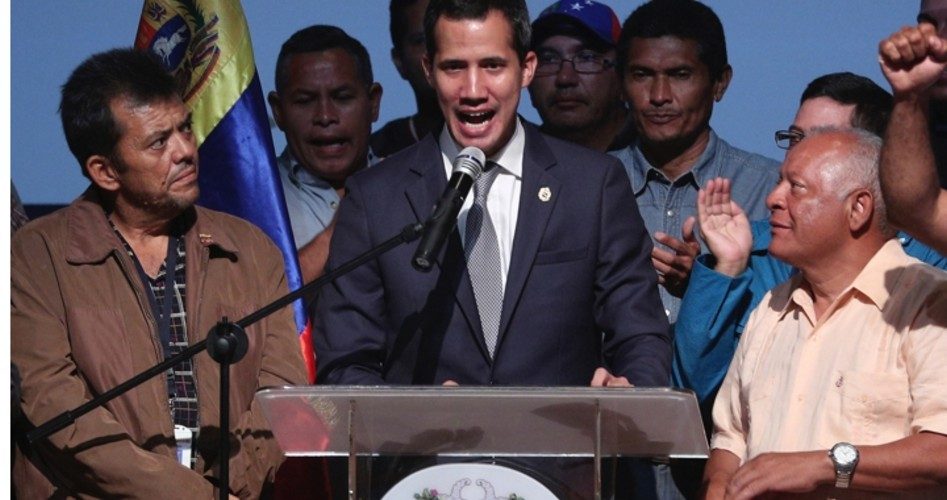
Juan Guaidó, Nicolás Maduro’s opposition in Venezuela, said on Saturday that the reason his attempted coup failed last week was that he overestimated the support he would be getting from Maduro’s military: “We need more [of his] soldiers to support [us], to back the constitution.”
The failure has left the foreign policy wonks and neocons embedded in the Trump administration scratching their heads. What else can they do to get rid of Maduro and replace him with Guaidó?
Their options are limited. There are conversations between President Trump and President Putin over Venezuela, with both of them saying they don’t want war. Said Trump following that phone call on Friday: “[Putin] is not looking at all to get involved in Venezuela other than he’d like to see something positive for Venezuela.” Trump failed to mention that Putin is already involved in Venezuela, both directly and indirectly through its vassal state, Cuba.
In fact, Trump’s remarks contradicted statements made earlier by Secretary of State Mike Pompeo and National Security Advisor John Bolton, both of whom accused Russia and Cuba of assisting in Maduro’s “clinging to power” in Venezuela.
There are face-to-face meetings as another option. Pompeo is preparing for such a meeting with Russian Foreign Minister Sergev Lavrov on Monday for more conversations about the matter. Pompeo has already said what he plans to tell Lavrov: “I’m going to tell him the same thing the president told the world: that every country must get out, including the Russians. That’s what I’ll tell him. We don’t want anyone messing around with Venezuela.”
As another option, there’s lots of sabre-rattling. On ABC’s This Week, Pompeo threatened the use of the military force if other options fail: “We have a full range of options that we’re preparing for … [including] diplomatic options, political options, options with our allies and then ultimately a set of options that would involve the use of U.S. military.”
On Friday, there was a high-level meeting that included Pompeo, Bolton, Acting Defense Secretary Patrick Shanahan, and Navy Admiral Craig Faller, commander of the U.S. Southern Command. Reports are that the meeting was partly for show and partly to review various “blue water” options (Venezuela is bordered on the north by both the Caribbean Sea and the Atlantic Ocean). Shanahan said “all options are comprehensive, but there is a lot of water nearby.” Following that meeting, the group issued a statement saying “U.S. Southern Command … remains prepared to support all options, when requested by senior leadership.”
They plan to meet again “in a few more days.”
The White House is scrambling to find other options. The National Security Council is pressuring the Defense Department for military ideas, while Pompeo is looking for ways to entice Russia to reduce or eliminate altogether its support of Maduro.
There are covert options being considered, along with psychological warfare to be levied on Maduro’s top brass. Said Jose Cardenas, a 30-year Washington veteran on South American affairs: “We need out-of-the-box thinking. We need to engage with the intelligence community to find out what’s within their capability to do things that … will change the equilibrium.… We need to play mind games with this regime so they don’t know what is coming or going.”
There’s no sure or straight path to Maduro’s ouster. His military has been largely coopted by Cuban intelligence services providing surveillance on potential traitors to the cause. They are not shy about using any manner or means to secure their loyalty, including terrorism, threats to family and relatives, torture, and murder.
In addition to the stick there’s also the carrot: the opportunity to get rich by participating in the enormous drug trafficking network that the United States has uncovered. It leads all the way to the top of the Maduro regime and purchases the loyalty of his top officials. As Bueno de Mesquita, a politics professor at New York University and author of The Dictator’s Handbook, noted: “As long as the senior members of the military are getting paid, Maduro is going to stay.” Added de Mesquita: “It is really a question of whether the flow of money can continue in a reliable way to the senior civil servants, to the military generals and to the judges. If the answer is yes, then the leaders may continue with Maduro … or with someone else from within the Maduro circle.”
That flow is in the billions of dollars despite the sanctions the United States has placed on Maduro’s people and government. Diego Moya-Ocampos, a political analyst for Latin America for IHS Markit, explained, “The Venezuelan high command has been benefitting from a complex system of patronage, which include corruption schemes linked to food imports and, in the case of a small and select group, to drug trafficking, gold smuggling and fuel smuggling operations.”
What option is left? Ron Paul’s plea to follow the Constitution is increasingly falling on deaf ears. So he took another tack, writing: “At a recent U.S. House committee hearing, one of the expert witnesses testified that … a [military] invasion would require between 100,000 and 150,000 U.S. troops, going up against maybe three times that number of Venezuelan troops in a country twice the size of Iraq. With a lot of jungle. All for a ‘prize’ that has nothing to do with U.S. security.”
The failure of Guaidó’s attempted coup last week has left the Trump administration with precious few options.
Photo: AP Images
An Ivy League graduate and former investment advisor, Bob is a regular contributor to The New American, writing primarily on economics and politics. He can be reached at [email protected].
Related article:
Venezuela’s Opposition Leader Guaidó Urges Army to Back Him, Not Maduro



